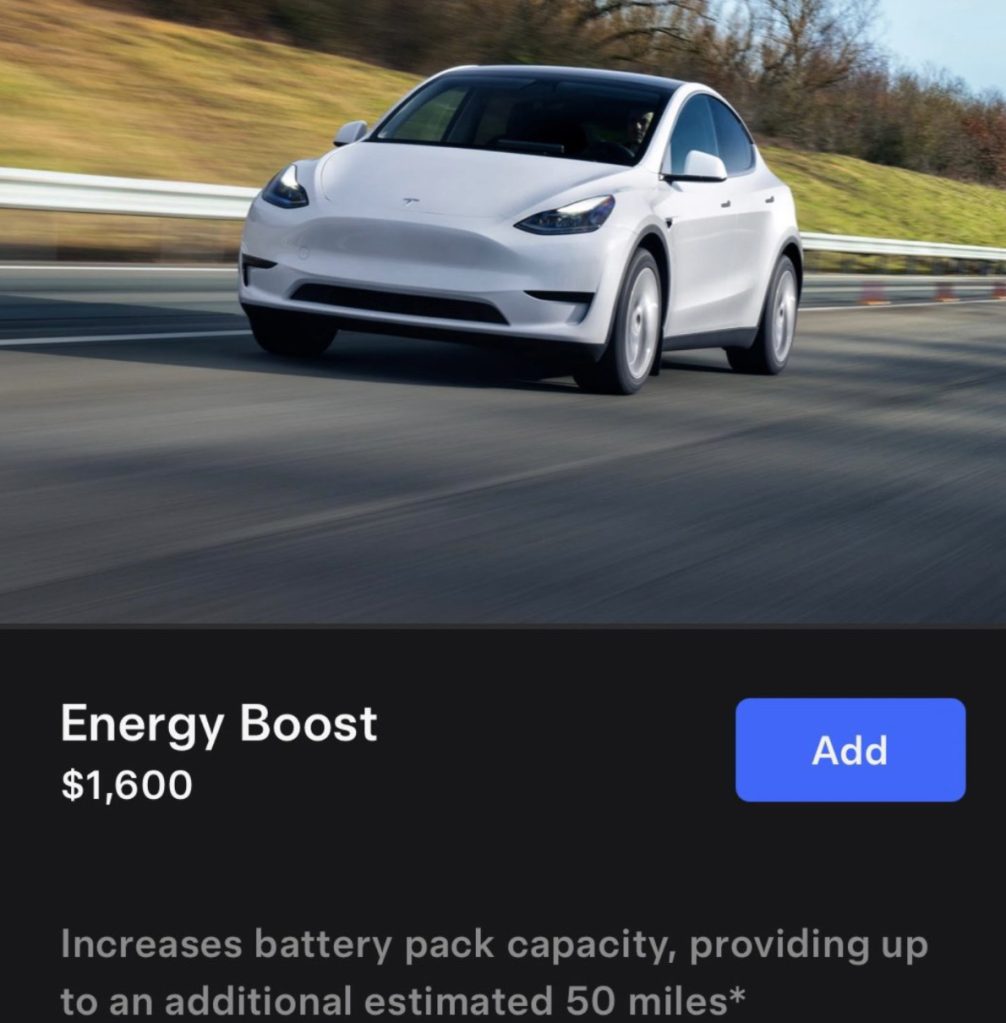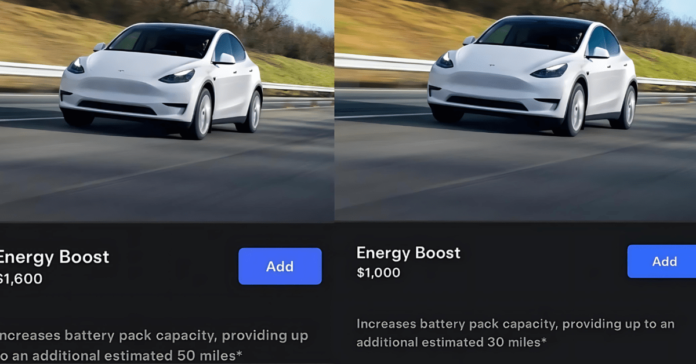Tesla has started offering an “energy boost” software unlock to recent buyers of the Model Y RWD, allowing them to unlock more battery capacity – for a price.
The Model Y RWD has been through lots of changes recently. Not only has its price varied quite a bit, but Tesla has introduced and then axed a “Standard Range” Model Y with smaller battery, and recently introduced a “Long Range” version alongside cancelling the SR model.
When it cancelled the SR model, Tesla also stated that the batteries in those models were actually bigger than advertised, and that it planned to offer software unlocks that would add 40-60 miles of range, depending on your battery cells, for $1,500-$2,000, as soon as it had regulatory approval to do so.
And now it looks like those upgrades are ready to go, as certain Model Y owners have started seeing an “Energy Boost” upgrade available in their Tesla app.
Some owners have been offered a $1,600 upgrade to add “up to 50 miles,” and some a $1,000 upgrade for “up to 30 miles.”
So it’s not quite what Tesla had promised – the numbers are a smidgen lower than the 40-60 miles for $1.5-2k that had been touted previously.


Each of these range estimates comes with an asterisk attached, stating “Estimates are based on internal modeling and will vary depending on factors like battery age and driving behaviors.”
Given that 50 miles is a pretty large chunk of additional range – some 15% or so – we can imagine that the numbers might suffer from typical Tesla, uh, “optimism.” And given that these numbers are “based on internal modeling” and not EPA-cycle testing, your mileage may vary.
The upgrade is available now, but only available in the US.
Electrek’s Take
Tesla has had this approach before, offering cars at one price level and then later offering unlocks to upgrade them via software.
Opinions are mixed on this practice. On the one hand, every automaker makes certain choices with its vehicles’ trim levels, and could offer customers more capability easily, but locks those capabilities behind higher price points (and indeed other products as well – computer CPU sellers do something similar). And Tesla intentionally doesn’t sell cars based on kWh capacity, but rather based on range, so it’s not like they’re selling you something other than what you got.
But on the other hand, it feels scummy to know that you bought an object that has been artificially hobbled by the manufacturer, and that you need to pay them for the privilege of using the full capabilities of the thing that you already paid them for. For example, people really disliked BMW’s heated seat subscription.
With a battery there are a lot of other interesting considerations too. First, which battery cells are being used, and why the difference? Is one more capable than the other? (Tesla has done this before, even dating back to the early days, with “A” and “B” battery packs on early Model S) And what effect will the unlocked capacity have on longevity? Was it held back for longevity purposes in the first place, or just for product differentiation?
And importantly: could Tesla update your software to reduce your car’s capabilities? If it does, will it pay you? This question isn’t even a hypothetical – it has happened before…. more than once. Even to the point of charging money for hardware owners already bought.
What would be nice is if Tesla ever answered any of these questions – why cars are being offered different upgrades, what sort of batteries these cars have, what kind of future plans it might have for your car’s future before you buy it, and so on. We’d reach out to ask them these questions, but, uh….
And one final question: while this is a good “price per mile” as far as range goes, do you even need that extra range? The Model Y already can go far enough, and has access to Superchargers. This extra range won’t help you charge faster on roadtrips, won’t protect your battery from degradation because it’s not a physically larger battery, and probably wasn’t necessary for your daily driving since you already bought the car to begin with – though it could help people who exclusively charge at public chargers have to charge a little less often. But for a lot of drivers, all it means is “number go up.” Does that matter?
What do you think about this new Energy Boost upgrade? Let us know in the comments. And if you have been offered the upgrade, let us know your car’s spec (SR or LR) and when you bought it, so we can try to figure out the pattern here.
Charge your electric vehicle at home using rooftop solar panels. Find a reliable and competitively priced solar installer near you on EnergySage, for free. They have pre-vetted installers competing for your business, ensuring high-quality solutions and 20-30% savings. It’s free, with no sales calls until you choose an installer. Compare personalized solar quotes online and receive guidance from unbiased Energy Advisers. Get started here. – ad*


